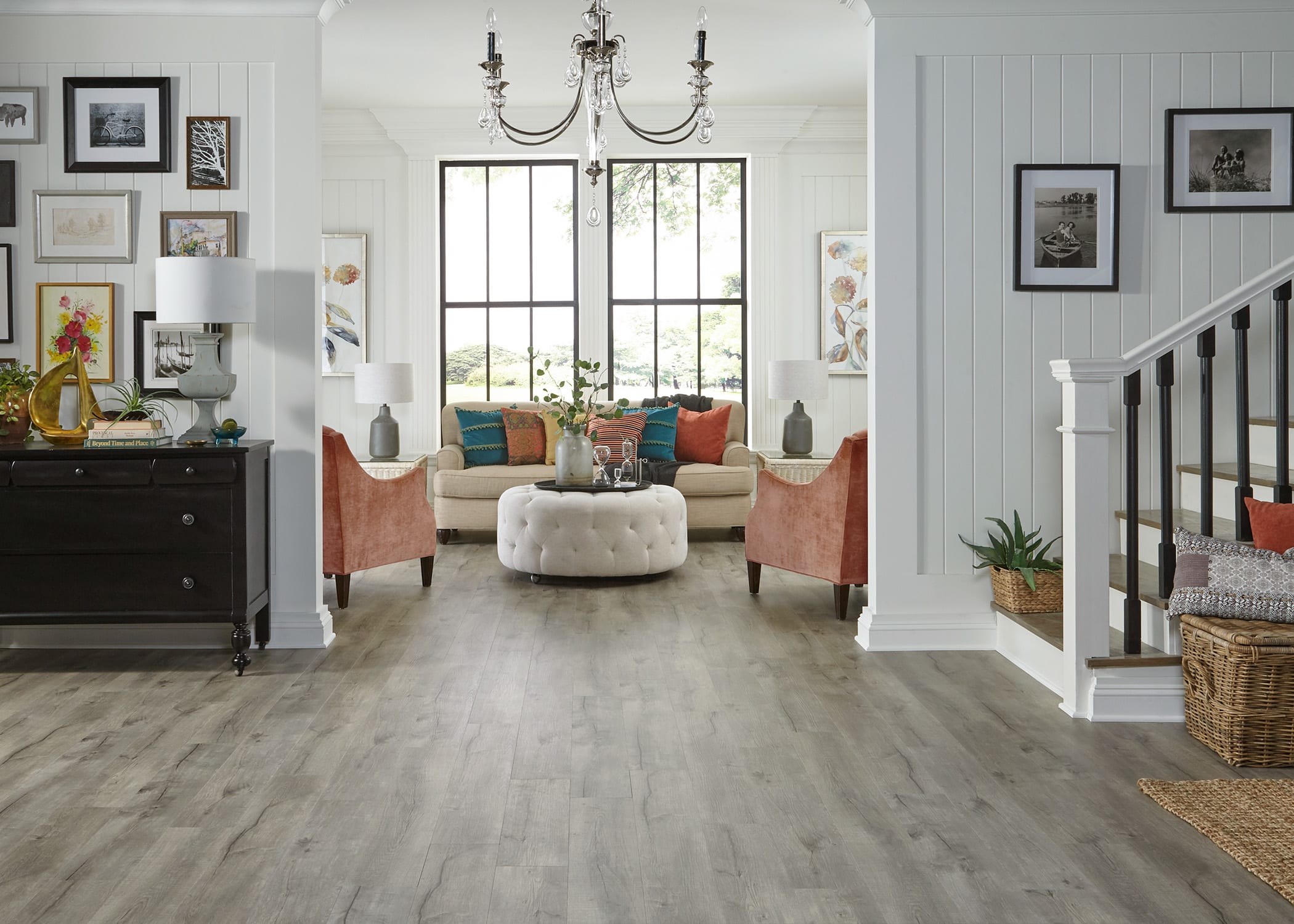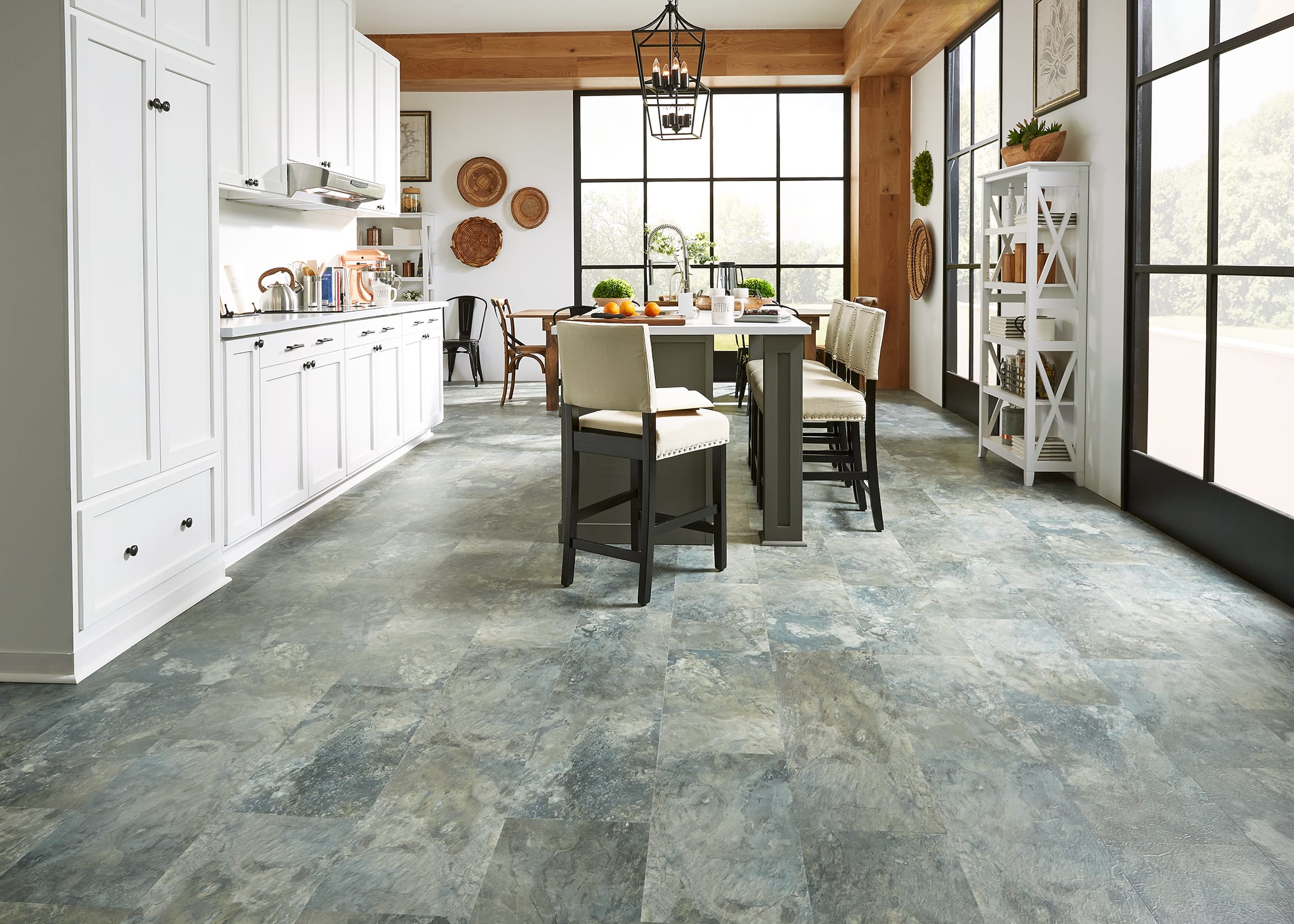- Home
- Education
- Flooring Basics
- Vinyl vs. Laminate Flooring | LL Flooring
Vinyl vs. Laminate Flooring | LL Flooring
Vinyl and laminate are two of the most popular types of flooring for homeowners. They offer similar benefits, including their availability in various colors and styles, and providing long-lasting wear in busy households.
Choosing Between Vinyl and Laminate Flooring
Vinyl and laminate flooring can affordably boost the look of your floors and come with several benefits, such as stylish designs and straightforward installation.
Still, buying flooring for your home requires a commitment. You should love the look, feel, and function of your new floors, which is why it's essential to understand what to expect when you buy laminate or vinyl flooring.
While neither type of flooring is necessarily better than the other, you might find that one suits your needs better than the other. This guide will explore some important considerations when choosing vinyl vs. laminate flooring.

8mm w/pad Driftwood Hickory Waterproof Rigid Vinyl Plank Flooring
Comparing Vinyl vs. Laminate Flooring
The following are a few considerations homeowners should take into account before deciding whether vinyl or laminate flooring is the best fit for their space. Composition Laminate and vinyl flooring are both made with several layers that strengthen and protect them. Laminate planks include a wood-based core made from raw or recycled wood chips mixed with resin for greater strength.
They also have a locking layer that allows the planks to click together during installation while preventing water seepage. At the top is a print layer that shows off the plank's design, finished with a protective wear layer that helps against scratches and wear. Some laminate flooring includes a balance layer for added stability and an attached underlayment for convenient installation. Vinyl flooring has some extra layers because its core has multi-layer construction.
Vinyl planks include a core, typically made with PVC or a stone-polymer blend, with an extra layer for stability and strength. Atop the printed design layer is a wear layer for protection. Many vinyl planks also include a UV coating to protect against sun damage. Despite their extra layers, vinyl planks are usually thinner than laminate planks.
Style
Vinyl and laminate flooring include various styles, colors, and patterns, helping you achieve the exact look you want in your home. Planks of each type of flooring can even mimic real hardwood floors with printed wood grain patterns and natural wood colors. Laminate flooring can sometimes gain a slight edge for its highly realistic wood appearance (read Not Your Grandma's Laminate!), but some homeowners prefer vinyl for its broad range of styles inspired by ceramic, stone, and other materials.

Comfort
Comfort is an important consideration for flooring. Laminate and vinyl planks both provide warmth and sturdy support under your foot. If you prefer some extra warmth we recommend adding underlayment, as its extra layer offers excellent insulation. This is a good option for planks in all areas, but especially those installed over concrete subfloors, which tend to stay cool.

10mm Antique Farmhouse Hickory Laminate Flooring
Cleaning and Maintenance
The protective-wear layer of laminate flooring is typically very tough to help prevent scratches from pets and regular wear and tear. Therefore, maintaining the appearance of laminate planks is relatively straightforward. Most laminate planks have little tolerance for water due to their wood-based core. That means it's best to use sweeping or dry mopping techniques to clean them regularly. However, some modern brands offer water-resistant laminate, which you can wet-mop when needed. Vinyl flooring is simple to clean using traditional methods, such as scrubbing and wet mopping. Their construction resists water, so spills are not usually worrisome for vinyl planks.
Room Considerations
Different rooms in your home may benefit from having one type of flooring over the other. If you want the same floors throughout your home, consider whether vinyl or laminate is the right choice for your overall needs. Vinyl is a good choice in rooms susceptible to moisture, such as laundry rooms, kitchens, or bathrooms. Its waterproof properties prevent spills or leaks from harming the planks. You can also look for premium laminate flooring with water protection. Areas with heavy foot traffic, such as a living room or entryway, may benefit from laminate. Its strong construction makes it a long-lasting option. Laminate can also keep the bedroom and home office floors warm and comfortable.
Cost Differences
You won't see much of a price difference in vinyl vs. laminate flooring. Both types of flooring are generally more affordable than many hardwood and tiles. On average, expect to pay between $1-$5 per square foot for either option. Premium planks of both types usually scale more toward the upper end of the price range when they include high-quality underlayment and protective sealing layers. Both laminate and vinyl can add to the value of your home as well. When choosing the right flooring for your home, consider the idea that you might pay more now for premium vinyl or laminate, but you could see a rise in your home's value from doing so.
Vinyl vs. Laminate Flooring: Choose What's Right for Your Home
Consider the points above when deciding on vinyl vs. laminate, such as where you'll lay your flooring and what features are most important to you. Both options are affordable, stylish, and long-lasting when appropriately maintained.
Find your perfect flooring at LL Flooring. We have multiple vinyl plank and laminate flooring options to suit the needs of every homeowner.
Also, browse these collections to see great options for each flooring type:
Waterproof Laminate Flooring in many wood styles from blonde to dark wood, and from contemporary to rustic and distressed.
The Americana Collection of Waterproof Vinyl Plank Flooring with stylish looks to match its waterproof toughness.
You can add 4 Free Samples to your cart and have them shipped right to you to compare for yourself, no credit card needed. If you still have questions, contact Customer Care or your closest LL Flooring Store to speak with an expert. We would be happy to help.